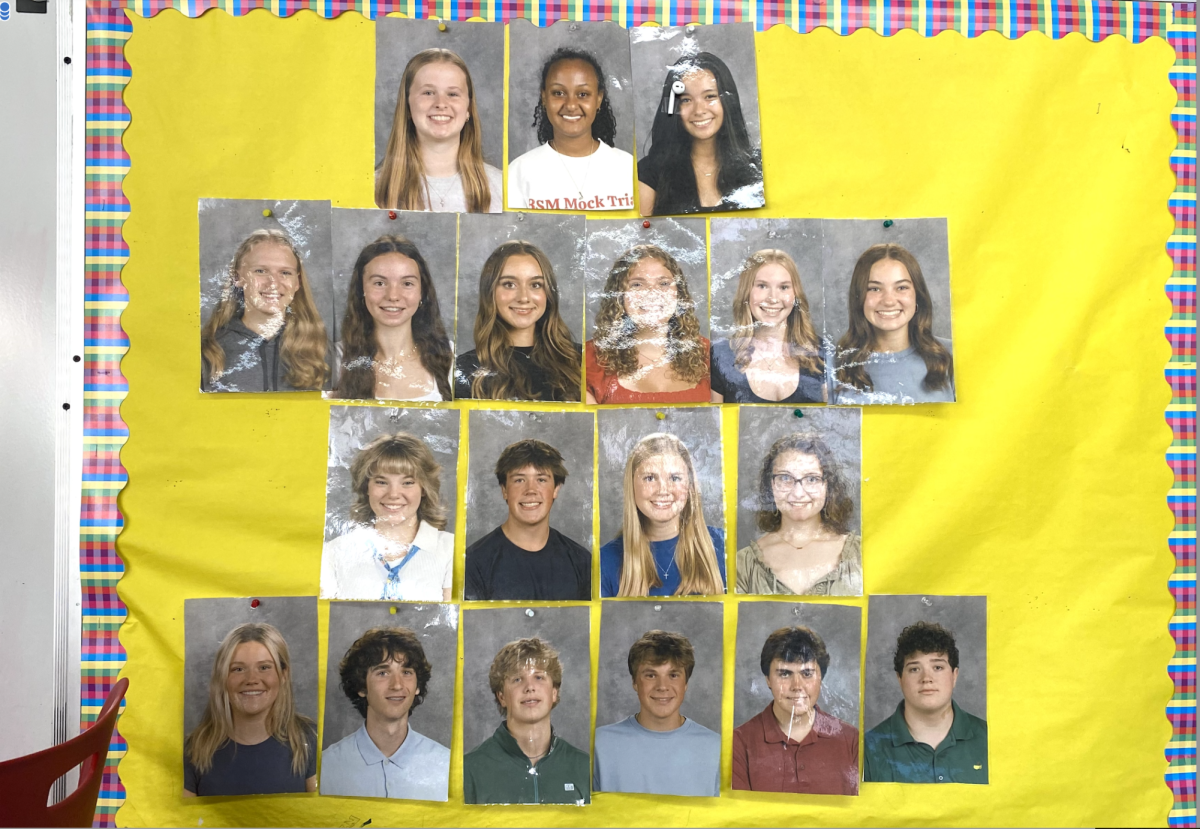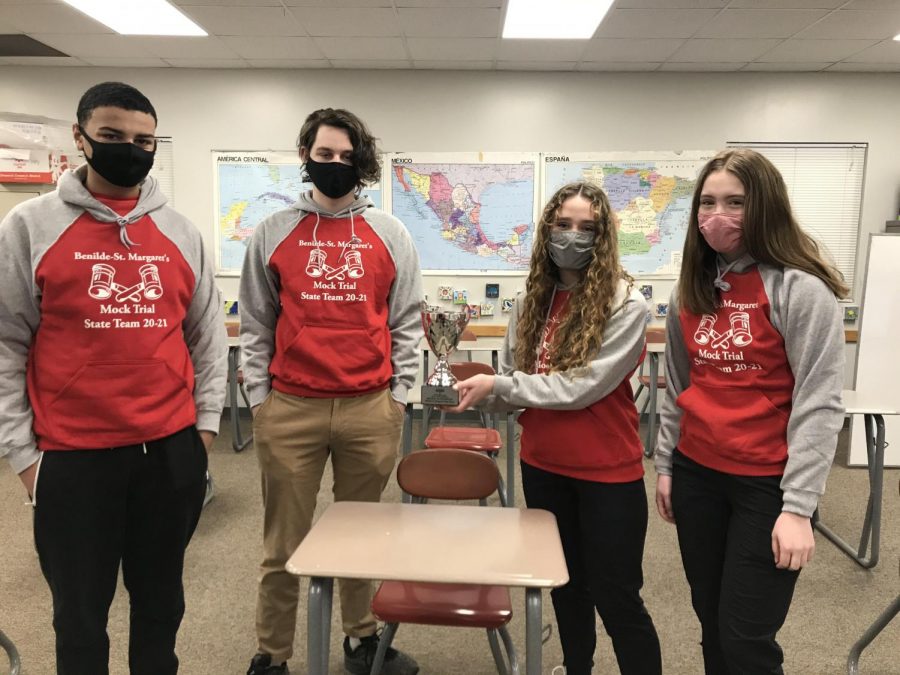Mock Trial enjoys a successful season and trip to state
The BSM Mock Trial varsity students had a successful season despite COVID restrictions that resulted in online practices and meets.
Between COVID protocols and new team members, the BSM Mock Trial team might have decided to write this year off. Instead, they met the challenge head on and earned a successful season and a trip to state.
Despite a rough last year, the team was satisfied with their performance this year and managed to go 7-1 throughout the season. “So this year we weren’t sure what to expect to be honest; we have a lot of new people (not new people to the program, but new people to varsity) this year. We have a group of sophomores that are very talented as well; we just lost a lot of seniors last year. The fact that we made it to state and that we went 7-1 is a testament to their ability and the work they put in this year,” Murray said.
COVID restrictions have completely changed the way Mock Trial is performed, and with competitions being held online the BSM team practiced online as well. “We decided we’re going to go all online, not because it’s more fun, not because it’s better, (well, it is because it’s better) It’s because we […] cracked the code for online mock trial because we had been doing things from Zoom from the very beginning, we got very comfortable with it, we would do internal scrimmages which is like one side against the other which was very hard with lawyers flipping and students flipping on witness and everything like that. So, since we had done everything online since the beginning we got more used to it when we actually went into competitions,” BSM Mock Trial Team member Suzy Haakonson said.
In a complete shift from previous years, Mock Trial tournaments are being held entirely online when the entire team would traditionally travel downtown and hold trials in real courts with real judges. “I know this year there were a lot of schools that actually did drop out because the entire competition is on Zoom, which a lot of people they’re [sic] not the biggest fan of, they aren’t very connected with it,” Haakonson said.
Additionally, the team practically had an entirely new varsity team on top of the changes brought with COVID. “We’re essentially a brand-new varsity team because we only have … three members from last year’s team who didn’t graduate. So we have the two captains and then we have one [who is] now a sophomore; those were the only ones who were on varsity last year,” Haakonson said.
Initially, the BSM team had to decide whether or not they were going to push for state once they decided to proceed with the season even with the changes. “It was a lot harder than I think that most people understand. Because, [with] us being a new team (and we have a brand-new JV team) it was very, very difficult … At the beginning of the year we sat down and I asked the team, “‘Do you want to go to state?’ … And so, unanimously the team decided this is a very important moment for us, we definitely want to go to state, this is now the third time in four years that we’re going to state, and we all wanted to do it and we were very headstrong about it … and we did great,” Haakonson said.
Leading up to all the rounds, the BSM team went to invitational scrimmages that were not scored. “We went to the Minnesota Golden Gavel, which is a scrimmage at the U of M where we placed third overall which is very significant because the year before we had placed I think fourth or fifth,” Haakonson said.
In the process of going to state, there are four preliminary rounds in the tournament. “So how it works is you have four preliminary rounds and essentially everyone is scored on a 1-10 scale, 10 being the best and 1 being the worst,” Haakonson said.
The Mock Trial team did extremely well in the preliminary rounds, and ensured their spot in the fifth round that would send them to state. “We went 4-0 (which means we won all four of them) and we had a very large point differential. How it works is you have two different scoring judges and a presiding judge. The presiding judge doesn’t score unless the two scoring judges actually have different opinions on who should win. So in the event that happens, you would have the presiding judge actually take over and say here’s the tie-breaker, I think this is who won. We actually didn’t have any split ballots, which means that the two scoring judges will dispute,” Haakonson said.
Even though practicing on Zoom was a major component of the team’s excellent performance in the preliminary rounds, Haakonson attributes most of their success to experience and good team members. “Regardless of the fact that we’re very new I think that our team is very good … we have a lot of experience with it, so our performances were there but I think that just going on Zoom helped us adjust better. So I wouldn’t say that it bettered our performance but I think that it was just helping us adjust better,” Haakonson said.
When preparing for the state tournament, they received a difficult case about contract law. “The Zoom part I don’t think was hard, I think what was hard was the fact that the case was a challenge this year because it was based on contract law, and a breach of contract which is very complicated,” BSM Mock Trial coach Senora Murray said.
The case itself was pretty complicated, and had multiple parts to it that further convoluted it. “We had two claims, a claim and we had a counterclaim so both sides were essentially suing each other so it was much more complicated. And, we always end up getting some clarifications that come out in December after the initial case comes out but this year we had a number of clarifications like a much higher number,” Murray said.
There was also a significant reduction in the amount of lawyer advisors they had this year, on top of an already difficult case. “We have two lawyers that are working with us and last year we had […] five. But it just so happened that three of them decided that it was time for them to move on to do something else, because all of our lawyer advisors do it pro bono, it’s free, it’s volunteer work for them. That part was hard because we only had two lawyers and we have two teams and we have thirty some kids,” Murray said.
Technology issues were also a problem during the tournament, because it could interrupt the course of the proceedings. “The other thing that was difficult on cross-examination in particular was technical issues. . . our internet would be wishy-washy and unstable and we’d get the message, and you’d hear people be just a garbled mess. So that’s really hard when you’re trying to cross someone, and you get your momentum and you’re ready for that big question that’s going to nail them and then that technology issue technology issue happens and you’re like ‘Oh, crap, what did you say?’ and you have to have them repeat it and you lost all that momentum,” Murray said.
The year before this one they expected to win the tournament, but ended up losing in round five. “I’ll be honest, last year we really thought we were going to go all the way. Two years prior we had placed fifth at state then we had placed fourth at state and we were moving up continuously. And last year we kind of had the dream team; we had some excellent seniors that had been on the team a number of years. We had very strong leadership last year; we had a lot of people that had been to state already and knew how that worked. We ended up just by the luck of the draw being placed against a team in round five that was the team that ended up winning last year at state. It’s hard because we thought we had a chance at it, but if you meet those teams before state and they knock you out in that round it’s a hard pill to swallow,” Murray said.
Murray also added that if anyone was interested in learning more about Mock Trial, they should contact her or any other members and that they accept all grades 7-12.




































![Teacher Lore: Mr. Hillman [Podcast]](https://bsmknighterrant.org/wp-content/uploads/2025/03/teacherlorelogo-1200x685.png)





